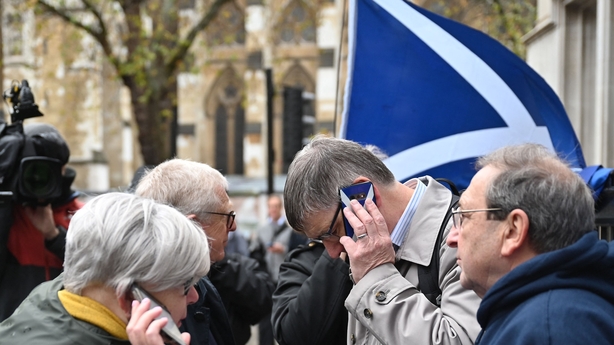The UK's highest court has ruled that the Scottish parliament cannot legislate for a second independence referendum without Westminster's consent.
The case was brought to the court after First Minister Nicola Sturgeon set out plans to hold a second vote on independence on 19 October 2023.
But Supreme Court president Robert Reed said this morning: "The Scottish parliament does not have the power to legislate for a referendum on Scottish independence."
It means the Scottish government's top law officer, the Lord Advocate, will not be able to clear the Bill for passage through the Scottish Parliament.
Dorothy Bain King's Counsel (KC) had referred the Scottish Independence Referendum Bill to the court, seeking its decision on whether Holyrood had the competence to pass the legislation.
The UK government, which is opposed to a second vote on independence, said it is "obvious" that the bill relates a matter reserved to Westminster.
Its legal representative, James Eadie KC, also argued that the bill was at too early a stage for the court to issue a ruling on.
Read more: SNP will use ruling to increase support for independence

Westminster has repeatedly refused to give Edinburgh the power to hold a referendum.
It considers that the last one - in 2014, when 55% of Scots rejected independence - settled the question for a generation.
But Ms Sturgeon and her party say there is now an "indisputable mandate" for another independence referendum, particularly in light of the UK's departure from the European Union.
Most voters in Scotland opposed Brexit.
'Achieving independence... is essential if Scotland is to escape the disaster of Brexit,' Scottish First Minister Nicola Sturgeon has said.
— RTÉ News (@rtenews) November 23, 2022
Speaking after a UK Supreme Court ruling, she said that an independence bid 'must be lawful' | Read more: https://t.co/AUbCUOOIuQ pic.twitter.com/vi7bX5CyN3
Ms Sturgeon wrote on Twitter that while she was "disappointed" by the decision, she would "respect " the ruling the court had made.
She said that the "ruling of @UKSupremeCourt - it doesn't make law, only interprets it".
She stated: "A law that doesn't allow Scotland to choose our own future without Westminster consent exposes as myth any notion of the UK as a voluntary partnership & makes case for Indy."
She said: "Today's ruling blocks one route to Scotland's voice being heard on independence - but in a democracy our voice cannot and will not be silenced."
Ms Sturgeon added she would be making a "full statement" in response to the Supreme Court ruling at 11.30am.
The Supreme Court president said the panel of five justices did not accept arguments made on behalf of the Scottish National Party (SNP), which intervened in the case, based on the "right to self determination" in international law.
The SNP had argued the limitations on the powers of the Scottish parliament in the Scotland Act should be "restrictively interpreted in a way which is compatible with that right under international law" and cited rulings in the Canadian Supreme Court and the International Court of Justice.
Mr Reed said the court in the Canadian case, which concerned Quebec, held that the right to self-determination under international law only exists in situations "of former colonies, or where a people is oppressed ... or where a definable group is denied meaningful access to government".
Additional reporting AFP
